

Agents of learning – the Teen Inquiry Project. In Teacher’s latest reader submission, Year 9 Learning Leader Rachael Williams discusses student agency and shares details of a project at her own school that offers teens a learning experience that’s relevant to their own lives and gives them the opportunity to work with community experts.
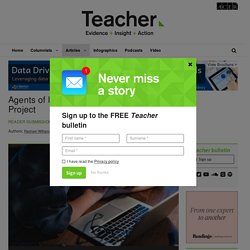
Schools often labour over the construction of a curriculum that matters but, ultimately, any decisions about what should or should not be included are usually made by adults. Surely teens are worthy of this responsibility, at least some of the time? Young people deserve learning experiences that build agency, ‘a sense that it’s possible to reshape the way things are by directing one’s actions purposefully (Tishman & Clapp, 2017, p.58)'.
Neuroscientist, Mary Helen Immordino-Yang suggests that ‘taking on messy, real world problems in multidimensional ways makes learning real and emotionally connected for students (Varlas, 2018)’. Personalized Learning Should Start in Libraries. Making the Shift to "Our" Classroom. Personalized vs. differentiated vs. individualized learning. Getting Better At Personalized Learning. Here’s a startling statistic: 40% of high school students are chronically disengaged in school.
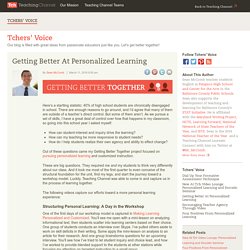
There are enough reasons to go around, and I’d agree that many of them are outside of a teacher’s direct control. But some of them aren’t. As we pursue a set of skills, I have a great deal of control over how that happens in my classroom, so going into this school year I asked myself: How can student-interest and inquiry drive the learning? Personalized Learning: What It Really Is and Why It Really Matters. The authors offer a framework—based on three years of campus visits—for thinking about (1) the circumstances under which personalized learning can help students and (2) the best way to evaluate the real educational value for products that are marketed under the personalized learning banner.
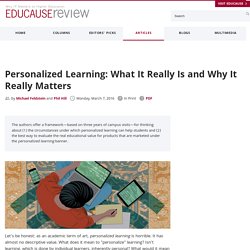
Continuum of Voice: What it Means for the Learner. Voice gives learners a chance to share their opinions about something they believe in.
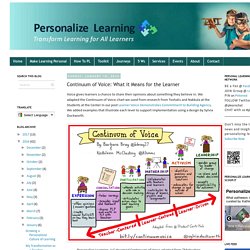
We adapted the Continuum of Voice chart we used from research from Toshalis and Nakkula at the Students at the Center in our post Learner Voice Demonstrates Commitment to Building Agency. We added examples that illustrate each level to support implementation using a design by Sylvia Duckworth. Personalize Learning, LLC designed Continuum of Voice adapted from "Motivation, Engagement, & Student Voice" by Toshalis & Nakkula from Students at the Center @StudentcCntrHub - Visual designed by Sylvia Duckworth @sylviaduckworth. Really Seeing Each and Every Learner. In such cases, learners often seem say with their nonverbal behaviors, “Wow, you really heard what I said!”
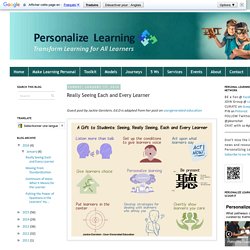
Give Learners Choice Giving learners choice gives them an opportunity to self-differentiate and to be responsible for their own learning while giving them the message that the educator respects who they are as unique individuals. Giving learners choice also respects their need for freedom: “The essence of the demand for freedom is the need of conditions which will enable an individual to make his own special contribution to a group interest, and to partake of its activities in such ways that social guidance shall be a matter of his own mental attitude, and not a mere authoritative dictation of his acts.” John Dewey Democracy and Education. Personalized Learning for Students Requires Personalized Learning for Teachers. This week CTQ bloggers kicked off a two week exploration of the theme: How Do Teachers [Really] Learn?
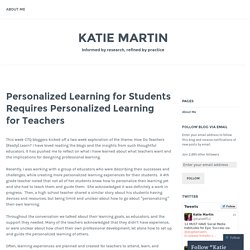
I have loved reading the blogs and the insights from such thoughtful educators. Can a Truly Student-Centered Education Be Available to All? Unschooling is a hotly debated topic on MindShift.
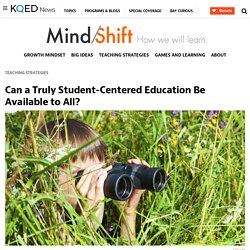
This subset of home schooling, which doesn’t use any set curriculum and is instead directed by the child’s interests, is vastly different from traditional public and private schools. While the freedom inherent in the model excites some readers, others question whether young people educated this way will learn the important information and skills they need to become productive adults in our society. Some readers object to unschooling because its proponents have opted out of the public system. Lisa Nielsen: The Innovative Educator: The Teacher Is Not The Most Important Factor When It Comes To Learning. A familiar refrain I hear among educators is this: “When it comes to learning, we can all agree that the most important factor is the teacher.”
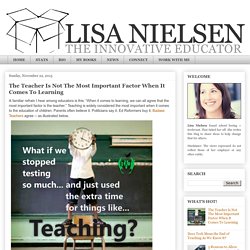
Teaching is widely considered the most important when it comes to the education of children. Parents often believe it. Politicians say it. Ed Reformers buy it. Badass Teachers agree -- as illustrated below. But it’s not factual. "It has become conventional in educational policy discussion to assert that “research shows” that “teachers are the most important influence on student achievement.”
A child with an average teacher who comes from a literate, economically secure, and stable family environment will, on average, have better achievement than a child with a superior teacher but with none of these contextual advantages. The reality is that when it comes to learning the teacher is not the most important factor...we don’t “all agree.” The student is. A Principal's Reflections: Why Personalize. How we best learn has been a hot topic for many years.
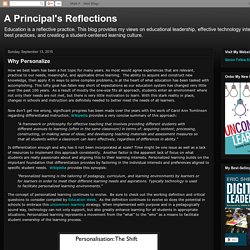
As most would agree experiences that are relevant, practical to our needs, meaningful, and applicable drive learning. The ability to acquire and construct new knowledge, then apply it in ways to solve complex problems, is at the heart of what education has been tasked with accomplishing. This lofty goal has fallen way short of expectations as our education system has changed very little over the past 100 years. As a result of mostly the one-size fits all approach, students enter an environment where not only their needs are not met, but there is very little motivation to learn.
With this stark reality in place, changes in schools and instruction are definitely needed to better meet the needs of all learners.Now don’t get me wrong, significant progress has been made over the years with the work of Carol Ann Tomlinson regarding differentiated instruction. Discover the Learner in Every Child. Collaborative Blog Series on Learner Agency with the Institute for Personalized Learning For too long, schools have identified who the learner is and how they learn using learning styles.
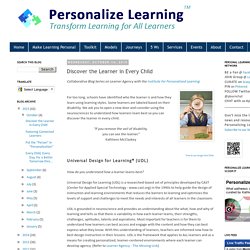
Some learners are labeled based on their disability. We ask you to open a new door and consider using the neurosciences to understand how learners learn best so you can discover the learner in every child. “If you remove the veil of disability, you can see the learner.” Kathleen McClaskey Universal Design for Learning® (UDL) How to Teach Without a Lecture and other fun.